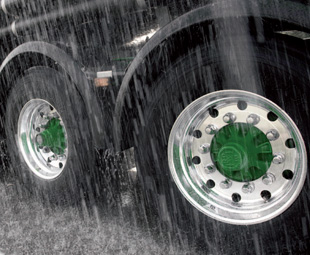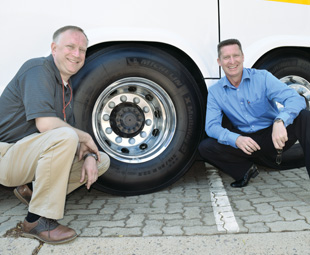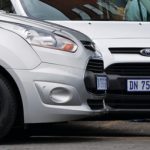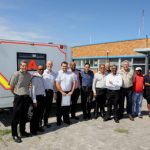Lightweight wheels, heavyweight savings

With Alcoa sponsoring the upcoming Truck Test 2015, FOCUS recently had the opportunity to catch up with John Jewiss, MD of Alcoa South Africa, and Randall Scheps, vice president and GM, Alcoa Wheel and Transportation Products
“It’s an extremely hard sell to motivate the purchase of a wheel that’s four-times more expensive than one made from steel,” Jewiss explains. “But, eventually operators realise – after doing 20 000 to 30 000 km a month, and saving 250 to 300 kg on their horse and up to 400 kg on a trailer – these wheels can save a lot in terms of payload, fuel savings, increased tyre life and reduction in brake wear.”
“Many people don’t know that forged aluminium wheels are inherently stronger than steel wheels; they are more dent and pothole resistant. It’s one of the few parts on a vehicle that has such extreme functionality, but is also very nice looking,” continues Scheps.
It’s clear that these experts have a passion for aluminium running through their veins – Alcoa aluminium, in particular …
“What I think really differentiates us is the depth of our technology and our technological expertise. We have 600 researchers in Pittsburgh, in the United States (US), who think about nothing but aluminium every day. There is a huge technical resource that we can call on that our competitors can’t get close to,” says Scheps, who is based at the company’s European headquarters in Budapest, Hungary, which serves South Africa.
 According to them, Alcoa is the only homologated forged aluminium wheel supplier in South Africa, with a dedicated office and warehouse. This allows Jewiss and his team to supply the local market with just-in-time delivery and committed back up and service.
According to them, Alcoa is the only homologated forged aluminium wheel supplier in South Africa, with a dedicated office and warehouse. This allows Jewiss and his team to supply the local market with just-in-time delivery and committed back up and service.
“That’s all part and parcel of our total commitment to the transport industry in South Africa,” he notes. “We set up our dedicated office and warehouse here ten years ago, and we’ve gone from strength to strength every year.”
Scheps notes that penetration in the US market is as high as 70 percent, while, with the advent of heavy Euro-6 emissions systems, European operators are increasingly looking to save weight where they can. “The great thing about our wheels is that they provide a ‘bolt-on’ weight saving that you can have instantly, and they pay for themselves in only 18 months,” he smiles.
Jewiss agrees: “If these wheels just looked good and didn’t have any functionality, we wouldn’t do the sales. Wheels are, however, a focal point, they make a massive difference … A clean set of wheels makes a vehicle look clean and customers, such as dairy farmers and transporters, like to see a clean truck …”
This is where Alcoa’s top-of-the-line Durabright wheels come in. “These are very popular where preventing downtime is of paramount importance: trucks can be washed in the depot and sent out to clients looking good, without the need to polish the wheels,” he says.
Despite all this, both men say that, locally and in Europe, the challenge is still to convince fleet operators that it’s worth making the investment. This is one of the reasons Alcoa South Africa has partnered with Truck Test 2015.
“The segment under review in Truck Test 2015 – extra-heavy commercial vehicles – is of paramount importance to us. This is an unbiased test for original equipment manufacturers to showcase what their trucks can achieve,” explains Jewiss. “For me, what really matters is what the fleets will take home from this test – if it shows that even the best fleet can save one or two percent of the total fuel bill, this could equate to thousands of rand saved per year.”
Add Alcoa wheels to that and the savings will keep on rolling in. In today’s tough economic climate, a set of aluminium wheels might be a hard sell – but the benefits are certainly undeniable.
Published by
Focus on Transport
focusmagsa




 Big news from FOCUS on Transport + Logist
Big news from FOCUS on Transport + Logist


 !
Starting 1 April, every
!
Starting 1 April, every


 FUSO: Driving the Future of Mobile Healthc
FUSO: Driving the Future of Mobile Healthc



 A brand
A brand




 Wondering about the maximum legal load for a
Wondering about the maximum legal load for a 
 The MAN hTGX powered by a hydrogen combus
The MAN hTGX powered by a hydrogen combus

 Exciting News for South African Operators
Exciting News for South African Operators


